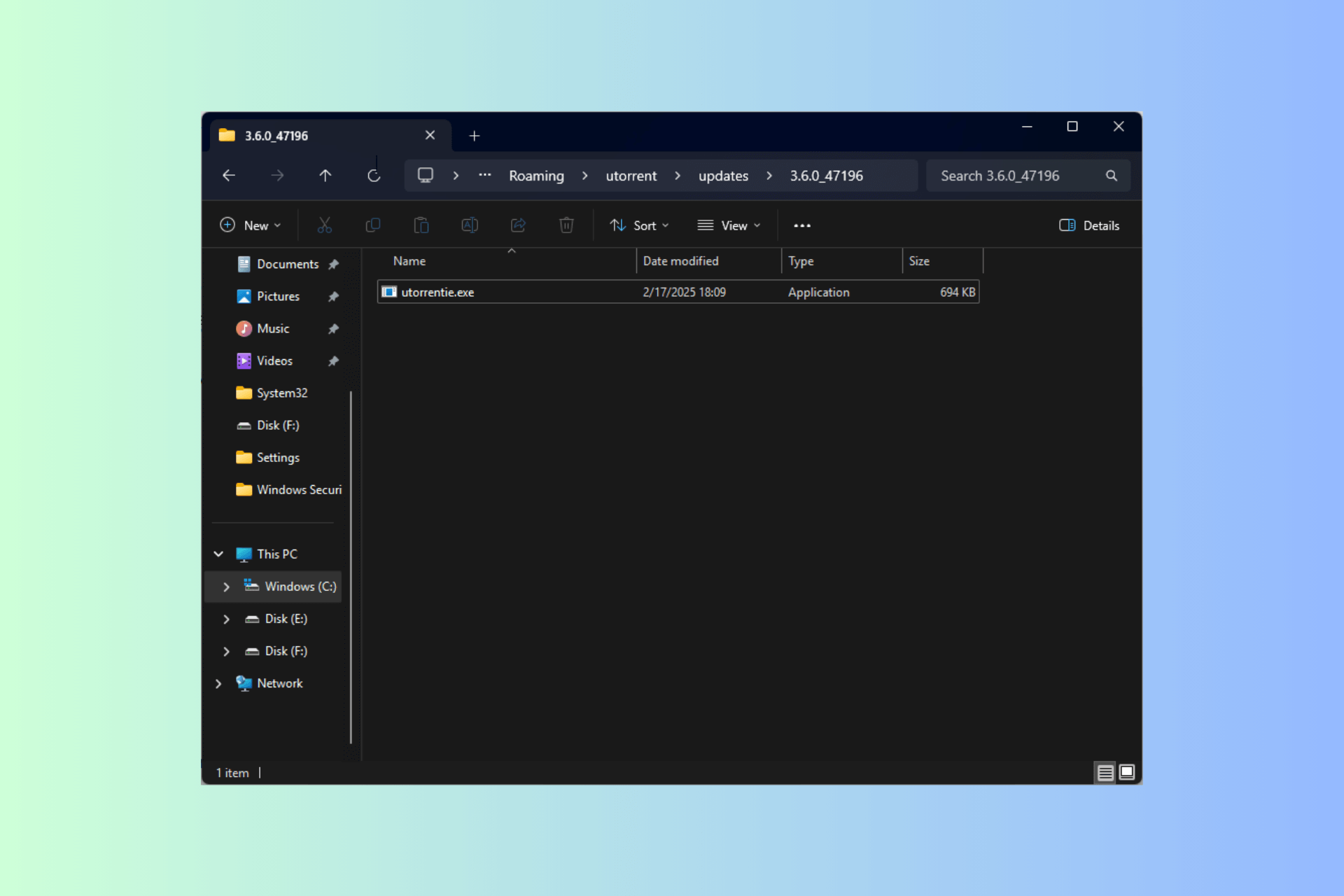Visual Studio vs Visual Studio Code: What's Different?
Check out the differences between Visual Code and VS Code
7 min. read
Updated on
Read our disclosure page to find out how can you help Windows Report sustain the editorial team. Read more
Key notes
- Visual Studio is an IDE that comes with a bunch of advanced functionalities built in.
- Visual Studio Code is a lightweight version of Visual Studio that relies on extensions.
- There are some other interesting differences between the two that we have mentioned in this guide.

Based on the language you are comfortable working with, most choose between Visual Studio vs Visual Studio Code. If you are in the same boat as several others and are confused about the differences between Visual Studio vs VS Code, this guide is here for you.
Here, we will give you the differences that will help you decide which tools to go for. Visual Studio is an Integrated Development Environment (IDE), on the other hand, VS Code is a rich text editor. However, the differences don’t end here. Let us discuss them.
Visual Studio vs Visual Studio Code: What are they?
1. Visual Studio
Microsoft Visual Studio is an IDE launching pad for developers that can use the tool to build, edit, and debug code. Once they are done with the process, they can easily publish the app.
An IDE is a robust tool far superior to a text editor, as it can let you do other things apart from just writing and editing your code.
An IDE such as Visual Studio gives you the flexibility of running the code or even going a step ahead and downloading plugins to automate the process. We have a bunch of Visual Studio extensions that you may want to know about to improve your productivity.
Visual Studio was introduced by Microsoft in 1997. It comes with support for C#, C, C++, Python, F#, .NET, HTML, CSS, JavaScript, and others. Do note that the support for Java was removed in 2017.
You can run Microsoft Visual Studio on Windows and Mac. It is offered in three editions; community, professional, and enterprise. The Visual Studio community version is free to use.
The installation on Windows is a bit complicated, but it is simpler on macOS. You can use Visual Studio to develop web, mobile, and desktop apps. It comes with .NET, with Unity, Azure, and Docker support by default. The .NET Core, Android, iOS, and macOS are optional.
2. Visual Studio Code
VS Code short for VS Code is a light version of Visual Studio. It is an open-source, lightweight text editor available for Windows, Mac, and Linux.
You can even use it on a web browser by visiting this website. The VS Code supports JavaScript, TypeScript, and Node JS.
However, you can use it to code in any language you want. To do that, you need to download relevant extensions, since it is a light version, the support doesn’t come built-in.
Since this is a mini version of VS, you don’t need much space on your PC to install it. Space around 200-250MB will do the job.
The VS Code also comes built-in with a debugger and IntelliSense. But to get the IntelliSense, compiler, and debugger features, you need to make use of extensions.
It supports languages such as C++, Java, C#, PHP, Go, and Python. VS Code is a text editor and falls in the same category as Atom, Sublime, and Text Wrangler. The things that make it more efficient are its robust features.
Visual Studio vs Visual Studio Code: Differences
Now that we have a basic understanding of what Visual Studio and VS Code tools are, let us go through the differences that will help you decide which suits your needs.
| Visual Studio | Visual Studio Code |
| Visual Studio is an Integrated Development Environment (IDE) tool. | Visual Studio Code is a text editor and is used to edit codes. |
| The Visual Studio processing code is slower and varies across platforms. | The processing speed of Visual Studio Code is slightly higher comparatively. |
| There is a free version of Visual Code, but also has better paid IDE variants. | Visual Studio Code is completely free of cost and is open source. |
| It cannot be used on a web browser. | You can use VS Code on a web browser. |
| IntelliSense is pretty advanced and the best in Visual Studio. | IntelliSense isn’t that powerful in Visual Studio Code. |
| The download size and process are a bit complicated, especially on Windows. | The download size and process are fairly simple for VS Code. |
| It requires more space on your PC to work smoothly. | It doesn’t require much space as it is a light version of Visual Studio. |
| Visual Studio can run only on macOS and Windows. | Visual Studio Code can run on macOS, Windows, and Linux. |
| Not many plugins are available for Visual Studio. | There is a wide range of plugins and extensions available for VS Code. |
Visual Studio vs Visual Studio Code: Pricing
One of the first things that might cross your mind when discussing using the Visual Studio and VS Code tools, is pricing, which we have discussed below:
1. Visual Studio pricing
Speaking of the best things, the Visual Studio IDE tool has a free version called Community. You can use it just like millions of other users.
Some of the notable features of VS are built any app for any platform, lets you design, edit, debug, and compile in a single tool, gives you access to thousands of extensions, and supports multiple coding languages.
Furthermore, if you wish to have advanced IDE functions, you have to go for the paid version of Visual Studio. Here are some of the pricing details you should know about the Visual Studio paid versions.
- Visual Studio Community version
- It is available free of cost.
- Visual Studio Professional version
- Visual Studio costs $45/month or $1,199/year.
- After the completion of one year, a developer needs to pay $799 to use it yearly.
- Visual Studio Enterprise version
- It will cost you $250/month or $5,999/year.
- After the completion of one year, a developer needs to pay $2,569 to use it yearly.
2. Visual Studio Code
Visual Studio Code is an open-source lightweight version of Visual Studio. It is free of cost and can be used by anyone and everyone.
Also, you can use it on a web browser on the go. It is the best way to keep up with your everyday work and create new apps.
This cost-saving aspect of Visual Studio Code might be one of the strongest deciding factors if you are looking for casual coding or are a freelancer.
Visual Studio vs Visual Studio Code: Verdict
For most developers, Visual Studio Code is the perfect choice for so many reasons that are listed below:
- It comes with cross-platform support.
- VS Code is available free of cost.
- Thanks to Electron Framework, the apps developed via VS Code are lean and can be updated seamlessly.
- VS Code is faster compared to Visual Studio.
- You can replicate many of the functions of the IDE on VS Code.
- There is a wide range of extensions available for VS Code.
- The download size is another factor in considering VS Code.
- You can even use it on your web browser.
However, serious developers still prefer Visual Studio IDE for coding for the reasons listed below:
- You don’t have to rely on official or third-party extensions to expand its functionalities.
- It is feature-rich by default, giving you access to important functions out of the box.
- Collaborating with the entire team is an easy job.
- You can perform heavy-duty coding and compiling using Visual Studio IDE.
- Visual Studio, when used in conjunction with UNITY, can help build cross-platform games, AR/VR apps, and more.
So, to make things much clearer, if you are a freelancer or a coder leaning towards cross-stack development, then you should go for Visual Studio Code.
Moreover, remember it is free, so if you aren’t into spending much, VS Code should be your choice.
VS Code has replaced Visual Studio IDE around the world for most coders, however, if you want a full-stacked coding tool that doesn’t rely much on extensions and offers complex functionalities, then you can go for Visual Studio.
Lastly, if you still can’t decide between the code editors, we advise you to try out both platforms and decide which one suits your needs.
You can check out our guide that explains how you can easily update Visual Studio to the latest version with a few simple steps.
Besides we also have a comparison guide between Atom and Visual Studio Code. It will help you decide which one to go for based on your needs.











User forum
0 messages